The Problem with Asking, “How to Lose Weight”
“how to lose weight”
“How to lose weight” is a search query yielding over 137 million results.Unfortunately for most people, most of these 137 million results just create more noise and confusion.
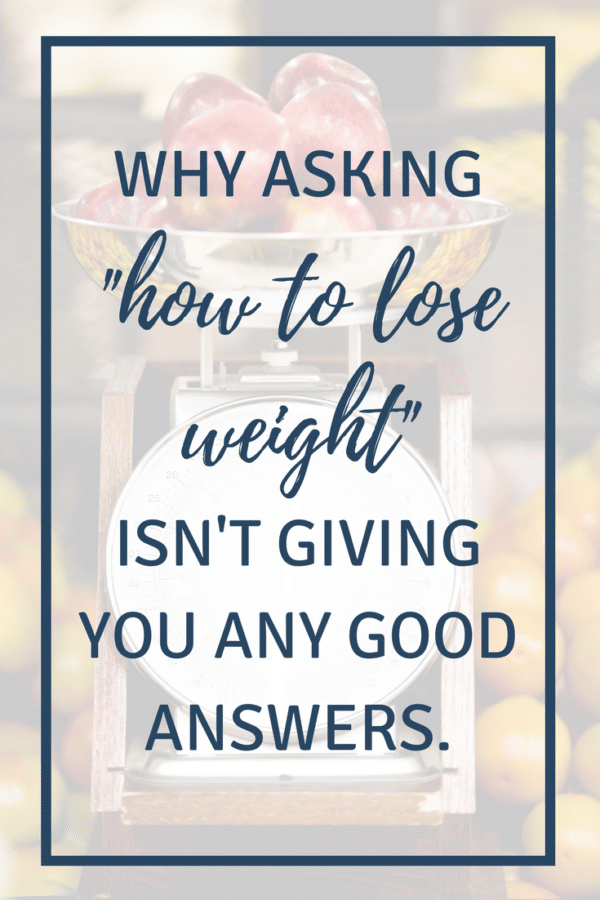
Before I went back to school to become a dietitian, I thought I was going to be one of those results; the answer to the unending search to the question, “how to lose weight”. I thought the years of school, supervised practice hours, and the national registration exam required to become a dietitian would teach me everything I needed to know so I would have the single most evidence-based answer telling you how to lose weight.
Except there’s no such thing. In fact, searching for “how to lose weight” kind of misses the mark and isn’t really the question most of us need to be asking.
Following my education and experience required to become a dietitian, the number one piece of knowledge I walked away with is that there is never one single answer, a one-size-fits-all solution, and in some cases – a concrete answer at all.
Nutrition is highly individualized, and is an ever-evolving field. With this individualized nature, there can be an element of trial and error. Everything from our taste buds to the ways our bodies respond to different foods differs from person to person, which basically means we all need to keep checking in with ourselves to see what’s working to help us feel and live our personal best.
Tangential to that is the fact that weight is also highly individualized. Weight is not this end-all, be-all measure of health; there are literally hundreds of ways to measure health and our health progress in our bodies. But somewhere along the way, weight and BMI have become seen as the go-to primary indicators of health.
Unfortunately the Body Mass Index (BMI) is not comprehensive and it’s not diagnostic. It only looks at weight; it doesn’t take into account body composition and the differences in fat, muscle, water, etc. It’s not a comprehensive health measure – you can have dozens of different individuals with the exact same BMI but of different sex, body compositions, ages, etc., and every single one of their physical appearances and their health will be different.
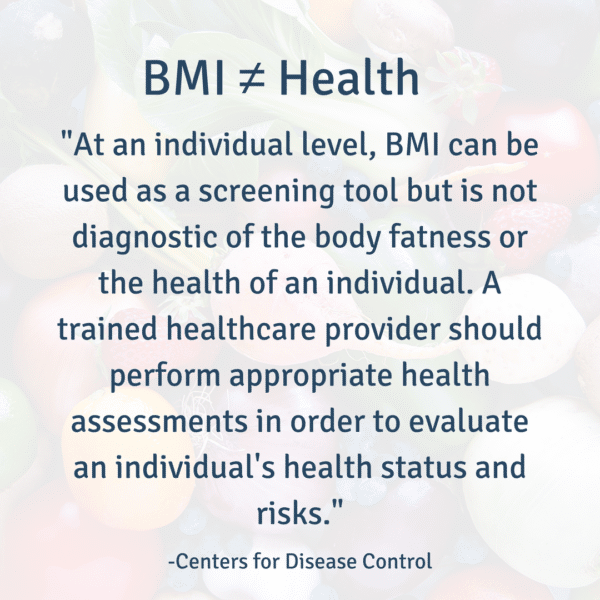
BMI and weight are not diagnostic of health. There can be correlations between BMI and health status, but correlation does not equal causation.
There’s a great analogy that’s used in a lot of intro sociology classes that brilliantly illustrates the difference between correlation and causation:
In the summer, ice cream sales increase. Also in the summer, homicide rates increase. So does this mean ice cream causes more murders? Is ice cream the summer treat of choice of murderers everywhere, fueling them to kill more people? Noooooo! It just means there is a correlation between summer/ higher temps, more ice cream being sold, and more murders. Correlations can (and should) be investigated for causal relationships, but just because there is a correlation does not mean there is causation.
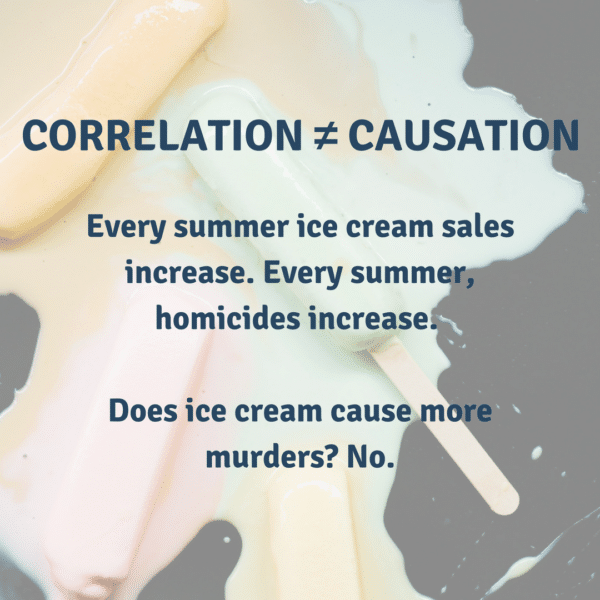
With everyone having individualized needs, it’s important to remember that we all have different bodies and healthy is going to look different for each of us. Even within our individual selves, weight is fluid! There’s a set point theory that suggests an individual’s “normal” weight is actually a weight range (which some experts suggest is up to a 20 pound range).
Now, this next part I want to be really sensitive to.
See, if you’re searching for answers for “how to lose weight” and you see this post that’s telling you there’s really no specific formula that will make everyone lose weight, it can be incredibly confusing and frustrating. I get it – I’ve been there. But it’s okay. You are allowed to feel whatever you’re feeling. There is no shame with any desires regarding your health, weight, etc.
In my nutrition practice, my weight philosophy isn’t black or white. Basically, when working with my clients, we will look at your weight. I’ll hear your concerns. We’ll look at your history and see if there’s any yo-yo dieting and fluctuating weight changes, rapid periods of weight loss or gain that may be a red flag for other health concerns, or any other type of weight fluctuations (i.e. due to water retention, medications, etc.). But then we take any knowledge we’ve gained and apply it to your total health picture.
We work together to improve your health. And not just the food on your plate – your total health. This means looking at the foods you’re consuming (especially as I primarily work with individuals with underlying food sensitivities and medical concerns), but also looking at your sleep quality and quantity, your stress load and stress management techniques, your activity, your social interactions, and more.
Weight can sometimes change, but it is not the primary reason my clients and I work together. I work with you to improve your health, weight aside. Depending on the individual, some may lose weight, some may gain weight, and some may have zero weight changes at all. To be clear: this DOES NOT mean if you work “hard enough” you will lose weight. For many individuals, effort is not indicative of results.
Your health and happiness are not reflected in the number on the scale. The shift in my approach to “how to lose weight” is that “how to lose weight” is not the center of my approach at all.
You know how when you toss a pebble in a lake, there are all these ripples that appear on the surface? Well, the pebbles are the center of my approach. They’re the changes that we make, the things that we try, going deeper into your health than what’s on the surface. Your weight? It’s just one of the gentle ripples on the surface. And however many ripples result from the pebble, we don’t really know, and we can’t control it; all we can control is the pebble.
So basically, the long and short of it is: there’s no way I can write a blog post to generically tell you how to lose weight. Your body may already be in the exact weight range that is healthy for YOU. And if not, by focusing on optimizing your individual health, with time, your weight will settle where it’s optimal for you.
And just to illustrate this point further, here are a couple case scenarios from past individuals I’ve worked with:
- The individual that is naturally quite slender and in the low end of the “normal” BMI. Yet they think because they’re skinny, their health is fine, so they continue to primarily drink soda, smoke, excessively consume alcohol, primarily eat fast food, their predominant source of vegetables are french fries, etc. This “normal” BMI does not correlate to optimal health for this individual.
- The individual whose BMI is categorically obese, yet they consume an abundance of produce, little processed foods, they’re active daily moving their body in a way that feels good to them. They always take the stairs, park in the back of the parking lot, etc. And aside from that one number on the scale, all other labs and health measures fall within normal parameters. This “obese” BMI has a very low correlation to the actual positive health this client has.
- The individual who is at a “normal” BMI but is unable to get pregnant until gaining some weight, and it’s not until they’re categorically “overweight” that their body is able to conceive and carry a pregnancy, after years of attempts. Once again – BMI has a low correlation to health.
- Dwayne “The Rock” Johnson. Okay, so he’s not a past client, but various media outlets have reported that categorically his BMI is obese and I’m assuming his weight is pretty high (hello muscle mass). Yet I’m pretty sure he could bench-press my house, so once again…very little value here with BMI.
No matter what – do what you need to do to achieve the best health for you to feel your best!


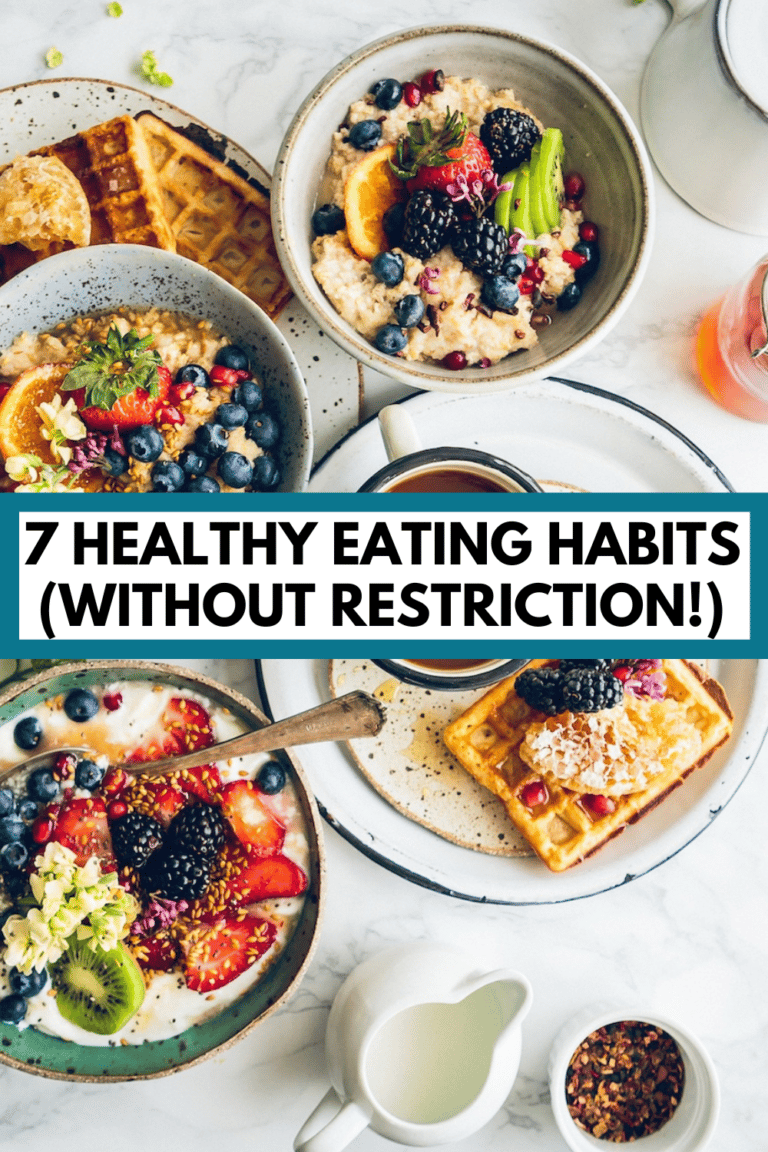
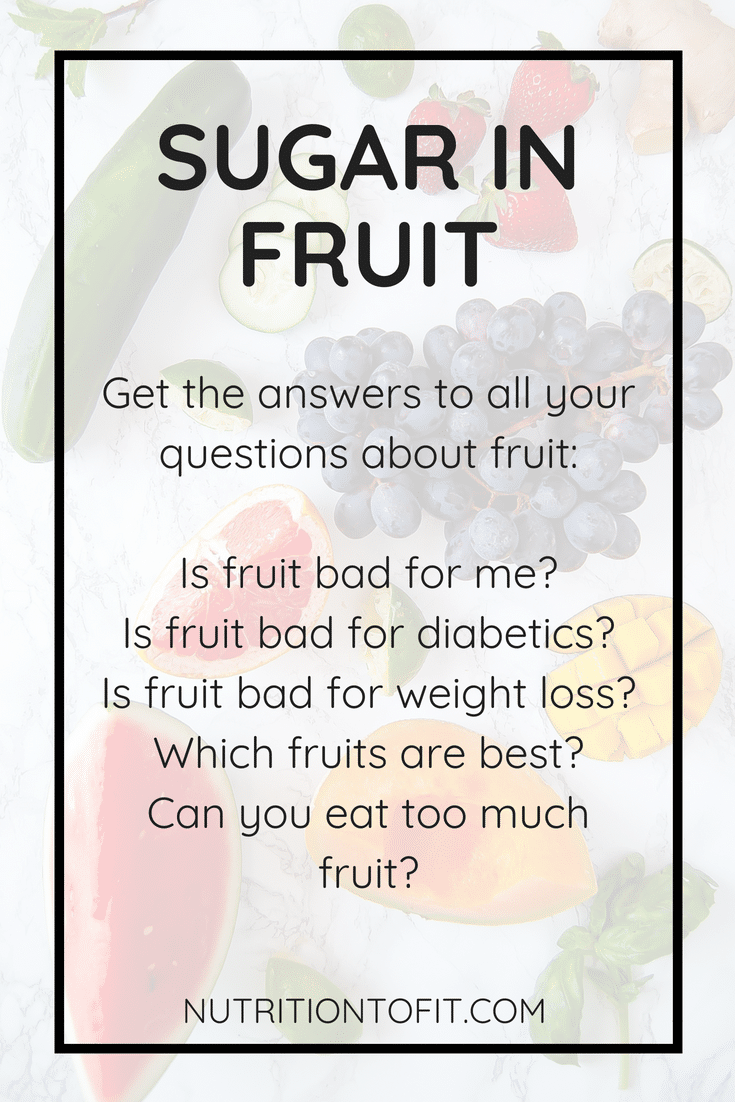

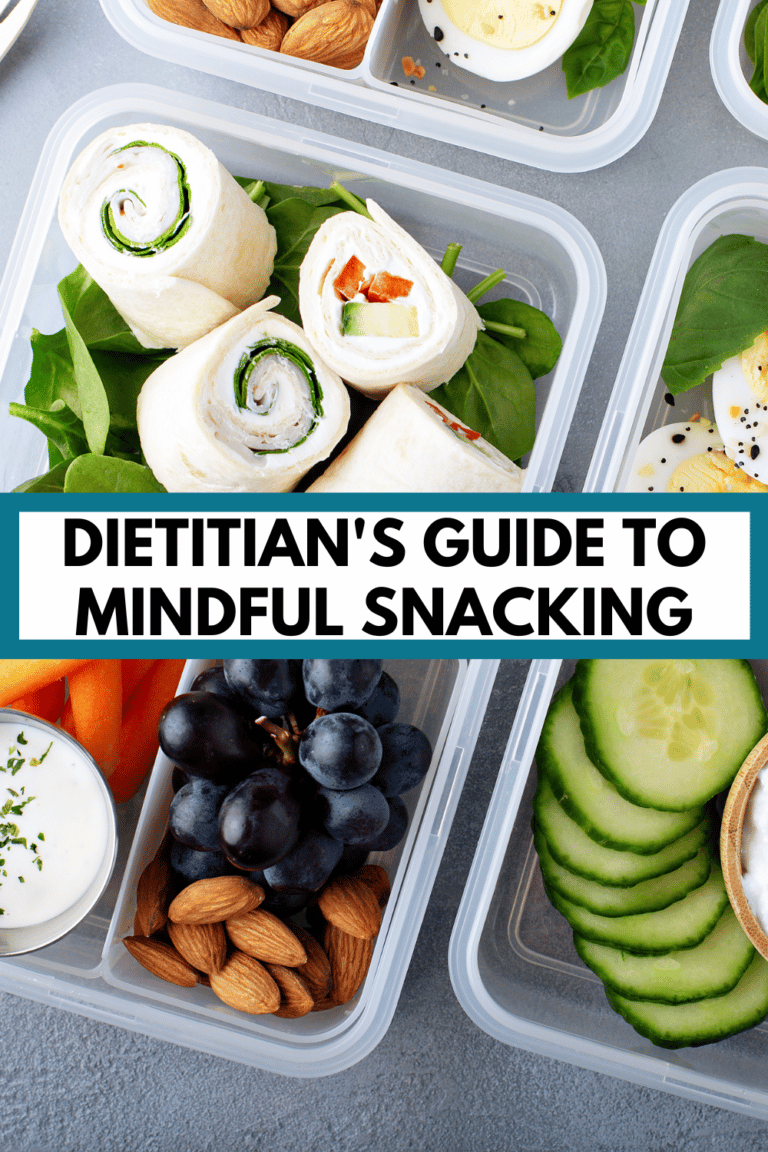
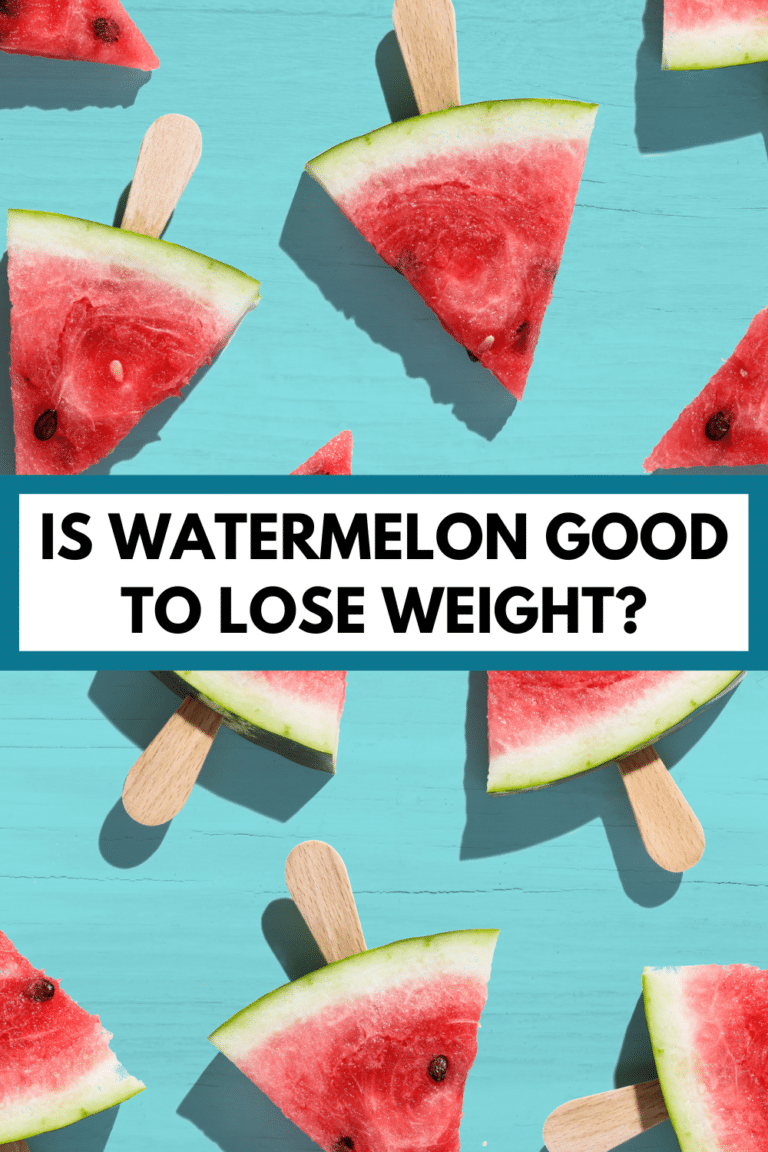
You seriously NAILED IT with this post!! You make the case for why looking at weight just doesn’t do the trick for making you a healthy individual.
Thank you for sharing this in a judgement free, compassionate way. If only I had heard this message years ago when I thought changing my weight was going to be the answer to all life’s problems…
You are a wise wise soul, my friend!
Thank you so much, Meme!! I wish so many of us had heard this message years ago! <3
Beautifully written Lindsey! I think you echo exactly what I tell my clients who come to see me looking for any and all answers to solve their fertility struggles… isn’t not about always about the BMI (like never, unless underweight 😉!) I fear the medical profession is taught so much about BMI we miss the big picture when it comes to total health. Way to bring this issue to light in such a professional way.
I feel the same way about my PCOS clients – and it’s so frustrating when all some doctors look at is PCOS dx + BMI = “just lose some weight” recommendation So glad for more open-minded, thorough colleagues like you in our field! 🙂